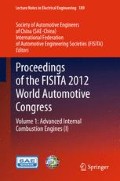Abstract
Automotive industries have strong interest in fuel economy. To enhance fuel economy, engine oils need to employ effective friction modifiers (FM). Molybdenum dithiocarbamate (MoDTC) is one of FM and superior in friction reduction performance to other FM especially in boundary lubrication regime. It is said that MoDTC produces MoS2 layer on the rubbing surface to reduce friction, and ZDDP has a synergistic effect with MoDTC to produce MoS2 layer effectively. In this paper, we analyzed the rubbing surfaces by several methods after rubbing with SRV tester to clarify the production mechanism of MoS2 layer. Results by EPMA showed that the combination of MoDTC and ZDDP decreased molybdenum intensity and increased sulfur intensity on lubricating surface compared to MoDTC alone. Results by XPS showed that MoDTC produced both of MoS2 and MoO3 layers while the combination of MoDTC and ZDDP produced only MoS2 layer selectively. Although ZDDP is an important sulfur supplier to MoDTC, at the same time ZDDP and MoDTC are under competing adsorption. We confirmed that a sulfur supplier to MoDTC played a very important role for producing MoS2 layer.
F2012-A03-018
Access this chapter
Tax calculation will be finalised at checkout
Purchases are for personal use only
References
Akiyama K, Kawai H, Sugiyama S (1998) Development of fuel economy 5 W-20 gasoline engine oil. Toyota Tech Rev 47(2):18–22
Tanaka H, Nagashima T, Sato T, Kawauchi S, The effect of 0 W-20 low viscosity engine oil on fuel economy. SAE 1999-01-3468
Sagawa T, Ishikawa T, Nakamura K, Ueno T, Ando T, Ishikawa M, Development of 0 W-20 ILSAC GF-3 gasoline engine oil. SAE 2002-01-1636
Yamamoto Y, Gondo S (1989) Friction and wear characteristics of molybdenum dithiocarbamate and molybdenum dithiophosphate. Tribol Trans 32:251–257
Grossiord C, Varlot K, Martin J-M, Le Mogue Th, Esnouf C, Inoue K (1998) MoS2 single sheet lubrication by molybdenum dithiocarbamate. Tribol Int 32(12):737–743
Muraki M, Wada H (1993) Frictional properties of organo molybdenum compounds in presence of ZnDTP under sliding conditiom (Part 1)—frictional properties of MoDTC and MoDTP. J Jpn Soc Tribol 38(10):919–926
Author information
Authors and Affiliations
Corresponding author
Editor information
Editors and Affiliations
Rights and permissions
Copyright information
© 2013 Springer-Verlag Berlin Heidelberg
About this paper
Cite this paper
Umehara, K., Tatsumi, Y., Tanaka, N. (2013). MoS2 Production Mechanism of MoDTC. In: Proceedings of the FISITA 2012 World Automotive Congress. Lecture Notes in Electrical Engineering, vol 189. Springer, Berlin, Heidelberg. https://doi.org/10.1007/978-3-642-33841-0_40
Download citation
DOI: https://doi.org/10.1007/978-3-642-33841-0_40
Published:
Publisher Name: Springer, Berlin, Heidelberg
Print ISBN: 978-3-642-33840-3
Online ISBN: 978-3-642-33841-0
eBook Packages: EngineeringEngineering (R0)

